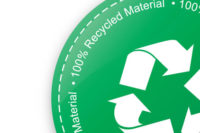How2Recycle label completes successful soft launch
Kellogg’s joins leading brands in implementing the Sustainable Packaging Coalition’s recycling label as project enters new phase

The Sustainable Packaging Coalition (SPC, www.sustainablepackaging.org), a project of sustainability nonprofit GreenBlue (www.greenblue.org), announces the successful completion of the soft launch phase of its How2Recycle recycling labeling system. In addition, major brand name Kellogg’s will be joining the 11 other leading companies already taking advantage of the How2Recycle Label, including Ampac, Costco Wholesale, General Mills and Minute Maid.
The How2Recycle Label is the only labeling system for packaging that communicates recyclability across all material types and gives explicit directions to consumers to influence their recycling behavior, and specifies when a package component is not recyclable. Research completed prior to and during the soft launch phase of the project has confirmed that the Label is understood by consumers, leads consumers to action, elicits positive impressions of products and companies, and meets Federal Trade Commission (FTC) requirements. In addition, the Label has proven to be a valuable tool for companies wishing to understand the specific recyclability of their packaging. In short, the Label is fulfilling the project’s goal of improving both the quality and quantity of package recycling. The complete Soft Launch Report is available for download free of charge.
In addition, GreenBlue is delighted to welcome The Kellogg Company to the How2Recycle Label program, and the public can expect to see the Label on a variety of familiar Kellogg’s and Kashi brand products this upcoming April.
“At Kellogg, we have a long-standing commitment to sustainability, and the How2Recycle Label on our products honors that legacy,” says Melissa Craig of The Kellogg Company. “We continually look for ways to educate consumers on the recyclability of our packaging materials. Consumers need clear, concise communication when it comes to recycling, so materials that can be reclaimed don’t accidentally end up in landfills. This label helps ensure all packaging components are recycled, as intended, to further reduce the environmental impact of our products and promote conservation.”
Of note is Kellogg’s use of the How2Recycle “Store Drop-off” version of the Label for certain plastic bags, wraps, and other films acceptable at many retail locations for recycling with plastic carry-out bags. The familiar cereal “bag in box” format will carry this label as it applies to the inside bag liner. The SPC has partnered with the Flexible Film Recycling Group of the American Chemistry Council to increase use of this label and awareness regarding film plastic recycling. The paperboard box remains recyclable to the majority of the public either at curbside or municipal drop-off locations.
Kellogg’s paperboard formats also carry the Recycled Paperboard Alliance’s (RPA) “100% recycled paperboard” symbol, making the important connection between the act of recycling and the critically important issue of buying products made from recycled materials. Paul Schutes, executive director of the RPA, comments, “The How2Recycle Label will lead to greater consumer understanding about the recyclability of fiber based packaging, leading to more fiber being collected, which is important to the 100% recycled paperboard industry.”
Full implementation of the label is now underway, and companies interested in participating are encouraged to contact GreenBlue soon, as it often takes considerable lead-time to integrate the Label into a company’s packaging process. The SPC’s goal is for the Label to appear on the majority of consumer product packaging by 2016.
“This long-term project of the SPC is poised to make a significant impact,” says GreenBlue senior manager Anne Bedarf, who with GreenBlue project associate Danielle Peacock has led the development of the How2Recycle Label. “With the revision of the FTC’s Green Guides, attention again has turned to accurate and transparent recyclability messaging, and the SPC’s How2Recycle Label is quickly becoming the industry standard. We designed the business model with a tiered structure to encourage participation by businesses of all sizes, and we look forward to working with a diverse group of forward-thinking companies and stakeholders as we enter the next phase.”
Looking for a reprint of this article?
From high-res PDFs to custom plaques, order your copy today!





